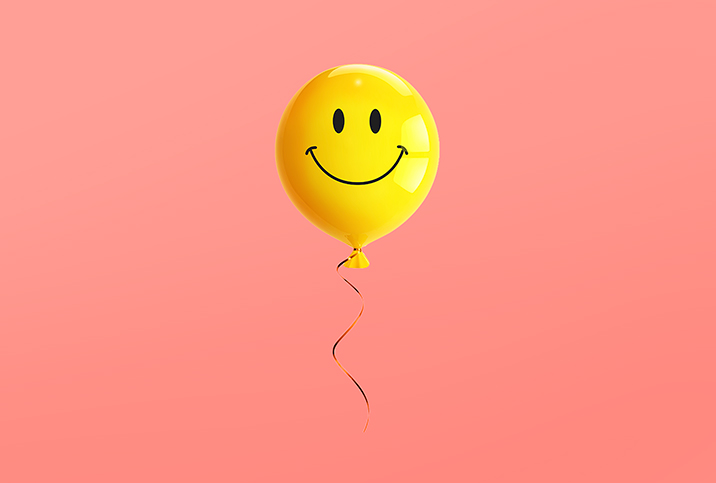How to Be Happier, Today, Right Now

When you cut your finger chopping vegetables and blood spurts every which way, you need a Band-Aid stat. What you don't need at that moment is an explainer on how to chop vegetables.
Similarly, whether you're beleaguered by a bad day at work or the chronic malaise brought on by the cumulative effects of primetime news describing war, plague, racism, climate catastrophe and the dissolution of modern democracy, you need an emotional life jacket immediately, not a tutorial on how to assemble a sailboat from scratch.
While there are myriad ways to feel happier over the long term—such as prioritizing sleep, deciding on a healthier diet and attending therapy, to name a few—these may not help you feel better here and now, so we asked four psychology experts what might.
What is happiness, anyway?
Happiness, for many people, is as elusive as it is misunderstood, in part, because it's so subjective. Reena B. Patel, a parenting expert, licensed educational psychologist and board-certified behavior analyst based in San Diego, said, "Happiness does not have an undervalue definition." Instead, it varies from one individual to another.
"[Happiness is a] subjective positive state of mind, which includes our sense of satisfaction with life, as well as our general well-being and self-actualization, including our mental or emotional states," said Lloyd Ripley-Evans, a psychologist and senior well-being facilitator at Plumm, a therapy resource site based in Johannesburg.
Seeking happiness is often not considered as serious an endeavor as quitting smoking or taking up yoga, but it can have equally meaningful benefits.
"Not only does being happy make life more enjoyable overall, but it also positively impacts an individual's overall health," explained Paul Poulakos, D.O., a board-certified psychiatrist in Greenwich Village, New York. "Happiness is often the impetus that drives one toward an overall more balanced and healthy life via encouraging connection with others and our environment, implementing healthier behaviors and taking better care of ourselves."
Better health and a more fulfilling life aren't the only payoffs from an investment in happiness. Research indicates a more optimistic, open-minded mindset can increase a person's likelihood of success in other facets of life, including academics and career.
How much of our happiness is out of our control?
As happiness is subjective and individualized, the degree to which each person can control it varies. However, most experts agree a certain percentage is heritable, while some portion is in our hands.
"It is hypothesized that genes make up about 40 percent of your ability to be happy," Poulakos said. "The remaining 60 percent is largely up to the lifestyle one lives and the environment that they are in. Known as the gene of happiness, allele A of the fatty acid amide hydrolase slows the degradation of anandamide, the cannabinoid responsible for increasing pleasure and decreasing pain perception. In addition, there are genes associated with positive emotions, such as short alleles for gene 5-HTTLPR, which has been shown to lead to smiling and laughing more. It also plays a role in serotonin regulation."
Serotonin, known as one of the "feel-good hormones," regulates anxiety and mood. Serotonin deficiency often correlates with depression, insomnia, bipolar disorder, post-traumatic stress disorder (PTSD) and panic disorder, among other ailments.
As for the other 60 percent, some of it is out of your control. Environment, for instance, might not be changeable and could substantially affect a person's quality of life. However, even if the cards are stacked in your favor, you're not automatically guaranteed to be happy. The preponderance of unhappy lottery winners is a testament to this fact.
Ripley-Evans noted a great deal of happiness is attributable to the quality of our relationship with ourselves, including self-perception, self-acceptance and self-awareness.
'Not only does being happy make life more enjoyable overall, but it also positively impacts an individual's overall health.'
"The happier we are with and within ourselves, the happier we are likely to feel," Ripley-Evans said. "External factors function more as a support or a trigger against our happiness.
"Happiness is unique to everyone, so what makes a person happy depends on them," Ripley-Evans continued. "Having said that, though, what is likely to lead to one's happiness is an awareness of the sense of satisfaction, joy and fulfillment we experience through various activities and engagements. It's not the act of completing certain tasks or activities which leads to feelings of happiness, but rather the experience of the activities themselves."
As for what specific activities and engagements tend to evoke happiness, experts said relationships, be they platonic, familial or romantic, are number one, followed by having a sense of purpose.
"Recent studies have also shown that cultivating meaningful connections with others can reduce the risk of depression. Performing acts of service like volunteer work and the expression of gratitude are other proven ways to strengthen our 'happiness muscles,'" explained Natalie Christine Dattilo, a Boston-based licensed clinical psychologist, head of psychiatry at Brigham and Women's Hospital and owner of Priority Wellness Group.
According to Dattilo, our perception of these external factors matters, too.
"Our experiences heavily influence our happiness, but how we interpret those experiences is one of the greatest predictors of happiness and an optimistic outlook," Dattilo said. "Our 'explanatory style'—or how we explain what's happening to us, especially setbacks—has been shown to predict our attitude, outlook and actions. We may not be able to control what happens to us, but we can control how we think about it, and when it comes to happiness, that makes all the difference."
If it makes you happy, why are you so sad?
Like $200 facials or spontaneous vacations in Seychelles, the "good vibes only" mindset is a facet of popular "self-care" culture that's as Instagram-able as it is inaccessible. Science suggests it is also ineffective.
"The biggest mistake I see people make when it comes to trying to achieve happiness is the misguided notion that feeling sad is bad and that the best way to cope with any sort of negative situation is to turn it into a positive one," Dattilo said. "We call this 'toxic positivity,' which is a form of emotional avoidance."
Cultivating a positive mindset is a useful coping tool, she advised. However, toxic positivity suggests embracing positivity and rejecting any negativity is the best—or only—way to cope. This mindset stems from our tendency to overvalue positive emotions and undervalue others. With these toxic positivity values, any negative emotions, including sadness, depression, anxiety, worry, rejection or disappointment, are regarded as inherently bad, and people who experience them are damaged, Dattilo noted.
"This is a problem because our authentic feelings are denied, minimized or invalidated, resulting in emotional suppression and significant self-doubt," Dattilo explained. "It creates pressure to appear OK and grateful 'no matter what.' True happiness comes from embracing and accepting our genuine emotional experience."
Not only is embracing a full spectrum of feelings key to emotional well-being, but as social psychologists have pointed out, negative emotions can have positive effects. Frustration, for instance, can motivate us to make a change, while mild sadness can provide a perspective that intensifies joy.
Poulakos said other common mistakes folks make in their pursuit of happiness are setting unattainable goals, resulting in unnecessary feelings of defeat; attaching happiness to a single factor, such as money; and viewing it as a destination rather than a lifelong journey.
"Happiness is found yesterday, today, tomorrow, and all the days thereafter," Poulakos said. "If viewed as a destination, one overlooks the journey and, hence, limits all the opportunities to experience happiness along the way."
5 things you can do to feel happier right now
Now it may seem trite to say there's something you can do right now to make yourself happy. But there is, and you don't even have to work very hard to achieve one of these instant cures:
1. Laugh
"The fastest way to feel better is to laugh. Laughter really is the best medicine. It's free, and its effects are immediate," Dattilo said. "Follow a funny social media account or check out your favorite stand-up comic on Netflix. Share a funny meme or GIF in a group text. Laughter has been shown to release endorphins, our natural feel-good brain chemicals, and reduce cortisol levels in our bloodstream."
Cortisol is known as the "stress hormone" released by the adrenal glands. A reduction in cortisol levels is associated with the lowering of anxiety.
"Nothing is certain in life, and nothing is as detrimental as we might initially perceive it," Poulakos said. "Find the humor, make a joke, have a laugh. Don't be embarrassed to find humor in even the most difficult moments."
2. Enjoy the little things
Whether it's dancing in your living room, cuddling with a significant other, putting rainbow sprinkles in your latte or browsing cute pictures online, find something that makes you truly happy and purposefully make it part of your routine.
"Identify at least one thing in your day-to-day life that brings you genuine joy and seek to invest time and effort in becoming more mindful and conscious when engaging in or with this," Ripley-Evans advised. "This works similarly to the gratitude focus but is more action-oriented as we purposefully strive to amplify our enjoyment of the moment."
"Start small and spend time becoming self-aware of what makes you have positive emotions," Patel suggested. "Take a CliftonStrengths test to help see your positive traits, then use these traits to find things in life that highlight this."
3. Recall happy memories
"Close your eyes and bring a happy memory into your mind," Dattilo said. "Try to remember as many details as possible."
To enhance long-term happiness and keep your memory bank well-stocked, Dattilo recommended striving to be more mindful and appreciative of daily activities, even those which seem uninteresting. Over time, she said, this active engagement can strengthen the brain's reward center, bolstering your ability to experience pleasure.
"Even if a moment of happiness is fleeting, practice being fully present and savoring it," she said. "This will strengthen your ability to recall the memory of it in the future and preserve a sense of optimism and hope."
4. Get outside
"Connect with nature," Poulakos said. "Going outside into nature allows you to experience something larger than ourselves, which helps us maintain perspective and can assist in minimizing tendencies to catastrophize or focus on the negative in our lives."
Going outdoors on a sunny day is also the best way to get your daily dose of vitamin D, a nutrient vital to immune system function, bone health and emotional well-being.
If your outdoor excursion involves exercise, be it walking, running or cycling, all the better. Exercise releases endorphins, or "happy chemicals," and stimulates dopamine production, providing an instant mood boost. Moreover, numerous studies have shown regular exercise and spending time in nature can improve mental and physical health over time.
5. Be grateful
"Create a list of the things you're grateful for in your life," Ripley-Evans suggested. "This works because we cannot just stop thinking about negative, stressful and consuming thoughts. We need to seek to replace them. Creating a gratitude focus in our day helps shift our focus from the things causing us pain and discomfort to the things that bring us joy. Gratitude can be broad or focused and can range from health, relationships and environments to even things such as that first cup of coffee in the morning."
Don't worry. Be happy.


















